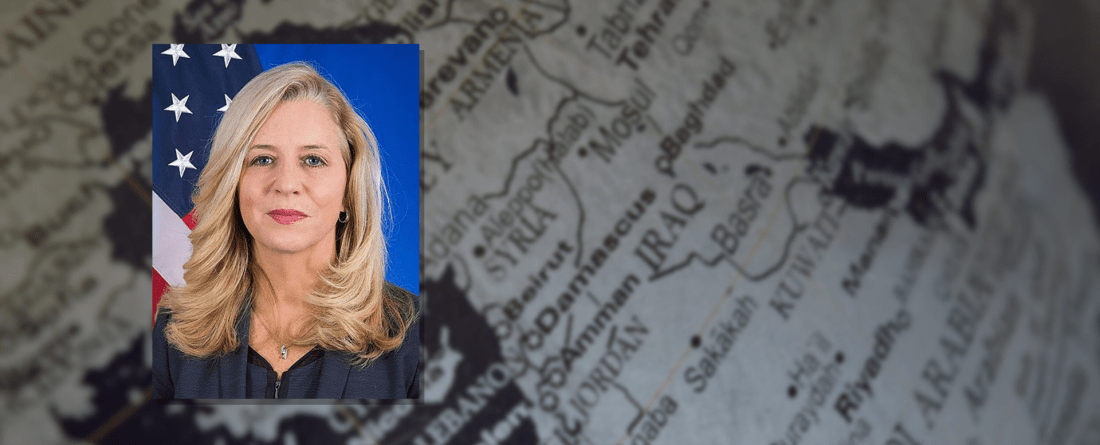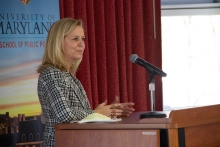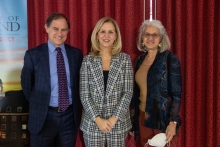
The minute Ellen McCarthy entered a career in national security service, she knew she was never turning back. Since her start in the intelligence field, McCarthy has held a myriad of roles in the intelligence community (IC), providing first-hand insights on cybersecurity and effective leadership, driving innovation and advancing diversity and digital transformation. McCarthy returned to the University of Maryland on March 3, in honor of International Women’s Day, to speak to the School of Public Policy community about the importance of intelligence in addressing global challenges.
Dean Orr began the event and welcomed attendees, saying that it marked a joyous occasion for multiple reasons: “Not only are we bringing back one of our distinguished alums to talk about issues that are extremely current and burning today,” he said, “it is also a celebration of the School of Public Policy’s 40th Anniversary.” Dean Orr emphasized the School’s long history of graduating women in the security field, and spoke about Catherine Kelleher, a former faculty member who established the Center for International and Security Studies at Maryland (CISSM), and founded the Women in International Security network (WIIS). The Catherine M. Kelleher Fellowship for International Security Studies honors Kelleher’s contributions to the School and the field of national security, and supports an exceptional graduate student pursuing their master’s or doctoral degree at the School.
McCarthy was a student of Kelleher’s during her time in the School of Public Policy, and followed in her footsteps, establishing the Amazing Women of the Intelligence Community in 2016, dedicated to the development of professional women serving the United States national security mission by bringing together amazing women throughout the IC to support, empower and inspire one another at all stages of their careers. McCarthy credits much of her success in the IC to her time as a master’s student in the School. “I owe this program so much,” she said, “the first thing I learned was the value of serving, from some incredible role models.” She continued, saying that the program prepared her for an incredible vocation in national security, and noting that it was the School's focus on both the substance and the process sides of policy — such as the business and operations of the government, the importance of development and human capital, and the importance of being strategic in all areas — that set her apart in her career.
McCarthy came to the University of Maryland after working as a reporter for the Capital Gazette in Annapolis, and was placed with the Institute for Defense Analysis for her second year internship and thesis requirement. “I was writing a paper on depressed trajectory ballistic missiles as a countermeasure of the strategic defense initiative, when a year and a half earlier I had been writing about birds on the eastern shore, and I actually kind of understood what I was talking about,” she joked. She says that it was the master’s program, her internship experience, and the passion of her fellow students with whom she had developed close friendships that helped her understand the importance of giving back and pushed her to pursue a career in intelligence.
Outlining her more than thirty year career trajectory, McCarthy explained that her internship at the Institute for Defense Analysis led to working as an all source intelligence analyst at the Office of Naval Intelligence and the U.S. Atlantic Command, and from there, she served in a variety of positions: Director of Intelligence Operations, Strategy and Policy for the United States Coast Guard (USCG), Chief Operating Officer of the National Geospatial Intelligence Agency, Director of the Human Capital Management Office and the Acting Director of Security in the Office of the Under Secretary of Defense for Intelligence , and President of the Intelligence and National Security Alliance. After her time in government service, she moved to the private sector, serving as President of Noblis NSP, where she led a team that provided cybersecurity and data analytic tools and services to clients in the IC, before returning to government service after being politically appointed to lead one of the IC’s agencies. McCarthy currently serves as Chairwoman and CEO of the Truth in Media Cooperative and Noodle Labs, as well as board advisor for SAP NS2, Fortem Technologies, Exiger and Babel Street.
McCarthy made sure to highlight that her movement from job to job and organization to organization was unique at the time, but crucially important to her career ambitions. “I learned during my moving around about the role of civil service and senior executive service. Our job as a civil servant or senior executive servant is to help fix things, to help drive things, to make things better for the American people, and I really bought into that idea. That was a reason why, as I saw a new opportunity, if it looked like fun, if it looked like it was going to check that box of making something better or fixing it, I did it,” she explained.
And so, when she was called back to government service, she jumped at the chance to serve as the Assistant Secretary of State for the Bureau of Intelligence and Research. While McCarthy had worked at six of the then seventeen agencies that made up the IC, her work had largely been in the areas of law enforcement and defense, and she had never worked on the policy side of things. Serving as the Assistant Secretary would mean she would be leading one of the (now eighteen) IC agencies and would be involved in diplomacy. “Diplomacy is an art, and intelligence is but one source that informs diplomacy,” McCarthy commented.
McCarthy spoke extensively about her time at Intelligence and Research, or I&R, remarking that it is known for being the “tip of the spear,” or the “mouse that roared” — essentially, a small organization with big impact. McCarthy proudly stated that I&R is oldest civilian all-source intelligence organization in the IC, not the Central Intelligence Agency (CIA), as so many believe; and recounted how the 200 analysts that make up I&R produce more articles that go into the president’s daily briefing (PDB) than either the CIA or Defense Intelligence Agency (DIA). McCarthy believes it is I&R’s size that makes them so effective; being small allows the organization to pivot quickly and are much more integrated with their clients than many other agencies.
McCarthy closed her talk by expanding upon some of the things that she thinks could be improved about the IC. In comparison to I&R, she says that the IC is “Way, way, way, way, way too big. Just like everywhere in government, when we want to fix a problem, we create a new element or bring in new people, instead of fixing what we’ve got, and as a result, we become so bureaucratized.” Relatedly, she says that the IC is not as integrated as it could be, which leads to a lot of bad data that corrupts and influences decisionmakers.
McCarthy also mentioned that the IC has become too politicized, but she made sure to clarify, it isn't the people in the intelligence community that have become politicized, but the people consuming the information, which to her, is emblematic of a loss of trust. To combat this, she suggests adding the American people to the IC’s list of clients: Intelligence isn’t just about diplomacy, law enforcement or defense operations; it is about providing trusted sources of information. To that end, she believes the IC’s business model should change to that of content providing, shifting their strategic goal to provide information to the people who need it, to influence policy, and help people do their jobs.
After completing the formal part of her lecture, McCarthy took questions from the audience, fielding queries about her reflections on some of the differences among the various agencies she worked in; how to go about declassifying intelligence information; the United States’ intelligence community’s relationships with other intelligence communities around the world; and of course, her thoughts on the current situation in Ukraine. Director of CISSM, Nancy Gallagher, facilitated the Q&A portion of the program, and thanked McCarthy for her inspiring talk, and for carrying on the tradition of supporting and advancing the education of women.


